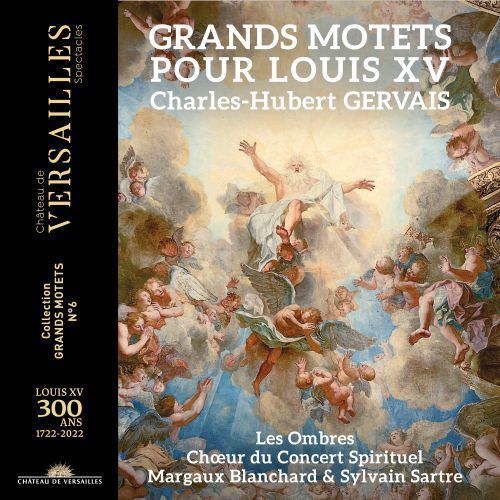GERVAIS Grands Motets pour Louis XV
View record and artist detailsRecord and Artist Details
Genre:
Vocal
Label: Château de Versailles Spectacles
Magazine Review Date: 11/2022
Media Format: CD or Download
Media Runtime: 51
Mastering:
DDD
Catalogue Number: CVS073

Tracks:
| Composition | Artist Credit |
|---|---|
| Super flumina Babilonis |
Charles-Hubert Gervais, Composer
(Le) Concert Spirituel Chorus Benoit Arnould, Baritone Deborah Cachet, Soprano Les Ombres Marie Perbost, Soprano Nicholas Scott, Haute-Contre Paco Garcia, Tenor Sylvain Sartre, Conductor |
| Miserere |
Charles-Hubert Gervais, Composer
(Le) Concert Spirituel Chorus Benoit Arnould, Baritone Deborah Cachet, Soprano Les Ombres Marie Perbost, Soprano Nicholas Scott, Haute-Contre Paco Garcia, Tenor Sylvain Sartre, Conductor |
| Jubilate Deo |
Charles-Hubert Gervais, Composer
(Le) Concert Spirituel Chorus Benoit Arnould, Baritone Deborah Cachet, Soprano Les Ombres Marie Perbost, Soprano Nicholas Scott, Haute-Contre Paco Garcia, Tenor Sylvain Sartre, Conductor |
Author: Alexandra Coghlan
His opera Hypermnestre may be pronounced ‘the best of the Regency period’ by Grove and others, and the composer himself may (or may not – history and myth are hard to untangle here) have demurred that his talents did not lie in Latin church music, but it was as sous-maître of the Chapelle du Roi that Charles-Hubert Gervais made his name. A contemporary and sometime colleague of André Campra and heir to Michel-Richard de Lalande, Gervais (1671-1744) follows in the footsteps of Rameau, Mondonville and Pierre Robert as the latest Baroque composer in the spotlight for the Château de Versailles’ ongoing series of Grands motets.
Period ensemble Les Ombres supply the colourful instrumental forces, joining the choir of Le Concert Spirituel and a handful of soloists under the direction of Sylvain Sartre. Booklet notes by Jean-Paul Montagnier speak of the composer’s ‘solid sense of drama’, but it’s the solidity rather than the drama that’s on display here in this sequence of attractive but conservative motets. Super flumina Babilonis, with its evocative, penitential text, offers perhaps the greatest dramatic opportunities. Willows weep in a pair of flutes, who sob gently in the background of the exquisite haute-contre aria ‘In salicibus in medio eius’ (beautifully floated by Nicholas Scott), echoed subsequently in the flexible arabesques of paired soprano voices (Marie Perbost, Déborah Cachet) in ‘Et qui abduxerunt nos’.
But ultimately the difference between this sorrowful landscape and the unclouded rejoicing of Jubilate Deo isn’t that marked. Both motets share a wonderfully characterful solo bassoon (Jérémie Papasergio), who all but steals the show in the latter’s ‘Scitote quoniam’ and the Miserere’s brooding baritone aria ‘Sacrificium Deo’, as well as solo arias that are consistently more varied and inventive than the choral episodes. The ‘Auditui meo’ – a rare ensemble for solo voices – is the highlight of the extended Miserere setting, along with the descriptive rising soprano scales that open the finale ‘Ut aedificentur’.
Sartre’s direction gives us crisp, well-balanced accounts, personality fostered by a pleasantly reedy quality in both orchestra and choir. But it’s elegance, not drama, that’s the watchword here.
Discover the world's largest classical music catalogue with Presto Music.

Gramophone Digital Club
- Digital Edition
- Digital Archive
- Reviews Database
- Full website access
From £8.75 / month
Subscribe
Gramophone Full Club
- Print Edition
- Digital Edition
- Digital Archive
- Reviews Database
- Full website access
From £11.00 / month
Subscribe
If you are a library, university or other organisation that would be interested in an institutional subscription to Gramophone please click here for further information.




